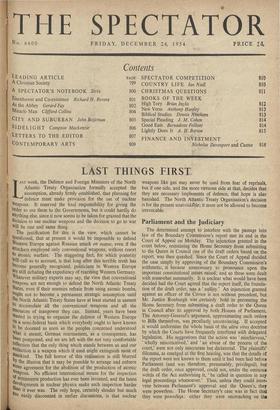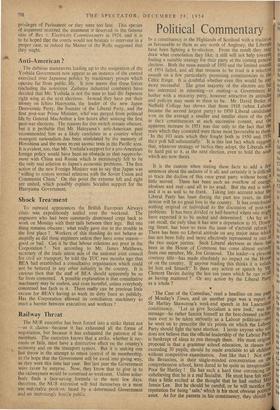Parliament and the Judiciary
The determined attempt to interfere with the passage into law of the Boundary Commission's report met its end in the Court of Appeal on Monday. The injunction granted in the court below, restraining the Home Secretary from submitting to the Queen in Council one of the draft orders based on the report, was then quashed. Since the Court of Appeal decided the case simply by approving of the Boundary Commission's arithmetic, it became unnecessary to pronounce upon the important constitutional issues raised; and so these were dealt with somewhat summarily. It is unclear what would have been decided had the Court agreed that the report itself, the founda- tion of the draft order, was a nullity.' An injunction granted against an officer of the Crown is not without precedent, but Mr. Justice Roxburgh was certainly bold in preventing the Home Secretary from submitting a draft order to the Queen in Council after its approval by both Houses of Parliament. The Attorney-General's argument, approximating such orders to Bills themselves, was peculiarly unconvincing. If accepted it would undermine the whole basis of the ultra vires doctrine by which the Courts have frequently interfered with delegated legislation. His suggestions that the action was mischievous,' ' wholly misconceived,' and an abuse of the process of the court,' were not only inaccurate but dictatorial. The plaintiffs' dilemma, as emelsed at the first hearing, was that the details of the report were not known to them until it had been laid before Parliament (and was therefore, presumably, privileged), but the draft order, once approved, could not, under the ominous words of the Act authorising it, be called in question in any legal proceedings whatsoever.' Thus, unless they could inter. vene between Parliament's approval and the Queen's, they were powerless. The Home Secretary's case was in fact that they were powerless : either they were encroaching on the privileges of Parliament or they were too late. This species of argument received the treatment it deserved in the famous case of Rex v. Electricity Commissioners in 1924, and it is to be hoped that the courts would not hesitate to intervene in a proper case, as indeed the Master of the Rolls suggested that they might.



























 Previous page
Previous page